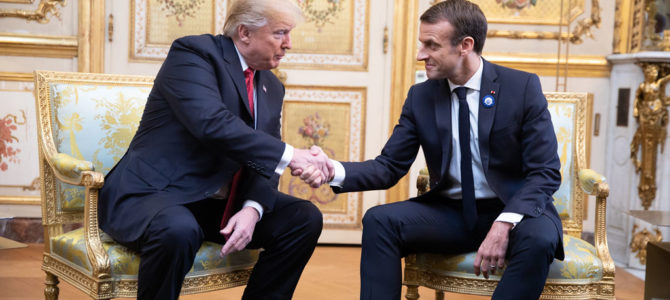
Everyone in Berlin, London, and Washington’s policy circles know it to be true, but no one has said what French President Emmanual Macron has out loud, except for President Trump. Much as it pains me, sitting here in England, to say that a Frenchman is correct, he is.
It might be a subtle French bid for Euro leadership and hegemony, but Macron’s recent concern in an interview about the North Atlantic Treaty Organization was as subtle as using a flamethrower to light a Jo Malone Pomegranate Noir candle.
Macron was positively Trumpian about a few things. When asked what is Europe’s endgame, Macron said Europe is not just a market, but a community: “Europe has lost track of its history. Europe has forgotten that it is a community, by increasingly thinking of itself as a market, with expansion as its end purpose…A market is not a community. A community is stronger: it has notions of solidarity, of convergence, which we’ve lost, and of political thought.”
He then pointed out that it is logical that America would refocus on China, an ever-growing revisionist hegemon in the Pacific and a threat far bigger than anything in the Western Hemisphere, and incomparably large compared to some tribals killing each other in the Middle East.
Macron also argued that the “End of History” is bunk. It’s over, much though some might try to return to the heady days of the early 1990s. “There was…the ‘end of history,’ of a limitless expansion of democracy, of the triumph of the West as a universal value system. That was the accepted truth at the time, until the 2000s, when a series of shocks demonstrated that it wasn’t actually so true.”
He is right about great power rivalry returning, and since great powers are the defining factors in world politics, he is correct about finding stability and equilibrium instead of evangelizing about rights and democracy, and he is correct about the Balkans being peripheral to the European Union’s interests. There’s nothing more foolish than an idealist who fails to see a changing world as it is, not as he thinks it ought to be.
Macron’s primary fire was not directed at the United States, much though Bloomberg would like to portray it that way, but it at Turkey: “You have an uncoordinated aggressive action by another NATO ally, Turkey, in an area where our interests are at stake. There has been no NATO planning, nor any coordination. There hasn’t even been any NATO deconfliction.”
While there might not be a problem between the militaries, the political alliance is under fire. There’s no denying that NATO expansion has made the alliance bloated. This is not the moat and drawbridge of freedom that saved Western Europe from communist tyranny. This is a new politically correct front for the liberal hegemony.
What benefit does North Macedonia bring to NATO, and if Montenegro can be a part of NATO, why not Mozambique, or Mongolia? Should NATO members spend money on learning Afghan Dari and Pushtu and building girl’s schools in Kurdistan? Is that what NATO was meant for? And why should anyone from Manchester, United Kingdom, or Massachusetts, United States die for Mariupol in Ukraine? Are LGBT policies in Chechnya the job of a defense alliance based on common shared interests?
The reality is this: After Brexit, 80 percent of NATO’s defense expenditure will come from non-EU allies. Only Germany leads a battlegroup in the East, a single one. The rest of the security burden is carried by two countries: the United States and the United Kingdom. That is unsustainable.
As Cato’s Ted Galen Carpenter wrote in his report, “A June 2015 Pew Research Center survey of public opinion in eight NATO countries showed that a median of 49 per cent of respondents thought their country should not defend an ally. France, Italy and Germany—three of the largest and most important European powers–all had majorities opposed to fulfilling their country’s obligation under Article 5.”
This reflects the growing concern of all international relations theorists that NATO in its current form is not a defense alliance at all, but a bureaucracy fighting to sustain and grow for survival. When push comes to shove, it would only be two Anglo-American great powers who spend their blood and treasure.
German defense spending is around 1.2 per cent of its gross domestic product. Their social spending is around 26 percent of GDP. Germany is also the strongest world critic of both the United Kingdom and the United States. Why on God’s green earth should anyone think of continuing this status quo?
This pattern to French assertiveness goes beyond just NATO posturing. Historic French foreign policy has been to ensure that France remains the dominant voice, compared to Mittel-Europa, or Germanic central Europe, in the European balance.
There’s an advantage in the French system that the Anglo-Americans do not possess. The French system of foreign policy is inherently hierarchical and top-down, regardless of the type of regime it has, a monarchy or a republic. The Anglo-American model instead relies heavily on public opinion. A diplomat from the United Kingdom or United States would be completely at ease to criticize his national leadership. Not a French diplomat, who’d support his country, regardless of who rules it.
There were no protests in Paris when Trump visited, as compared to London. The French understand national interest, a raison d’état, a lot more coherently than their counterparts do. Realism is in their blood. It was Cardinal Richelieu who supported the Protestant princes against the fellow Catholic superpower Habsburgs, simply due to its promotion of the balance of power.
Ever since, the French foreign policy has been to dominate central Europe, often at the cost of Germans, a position they lost permanently with the unification of Germany under Otto von Bismarck, and a position that they have tried to return to ever since. During the Cold War, as well, France was the only nuclear power, an on and off member of NATO, and never took part in joined decision-making. It pursued an independent nuclear deterrence as well as foreign policy, one that continued post-Cold War, as evident from repeated French unilateral military interventions in Africa.
France feared German re-unification post-Cold War, and the Franco-German division is nowhere more prominent than on the role of NATO. But interestingly, while Germany wants to leech on the United States and United Kingdom providing European security while sanctimoniously lecturing U.K. Prime Minister Boris Johnson and Trump about refugees and human rights, the French were always honest about their intentions. Macron’s attempt to take control of the EU is just another episode of the return of the historic French policy of “iron hand in a velvet glove.”
Regardless, he is right. NATO in its current form is obsolete and outdated. That doesn’t mean it cannot reform, but it is outdated, and that is a fact. An alliance in which member states do not share any common interest, common threat, equal contributions, or common values isn’t an alliance, but a bloated bureaucracy.
The paradox of NATO is that it institutionalizes Anglo-American hegemony, and ensures that no great power dominates the European continent, but at the cost of manpower and treasure which would be better spent somewhere else, where it is needed. The reason NATO muscle atrophied is because other member states know Uncle Sam will be there to break the glass in case of an emergency.
It is foolish to expect Western European powers to pay their fair share in defense when they know there are no threats of Russian tanks blitzing through Belgian meadows as long as British and American armor remains in the Baltics. These are facts, and for all his hidden intentions, Macron has been at least more honest about his assessment than most of the world’s leaders.









